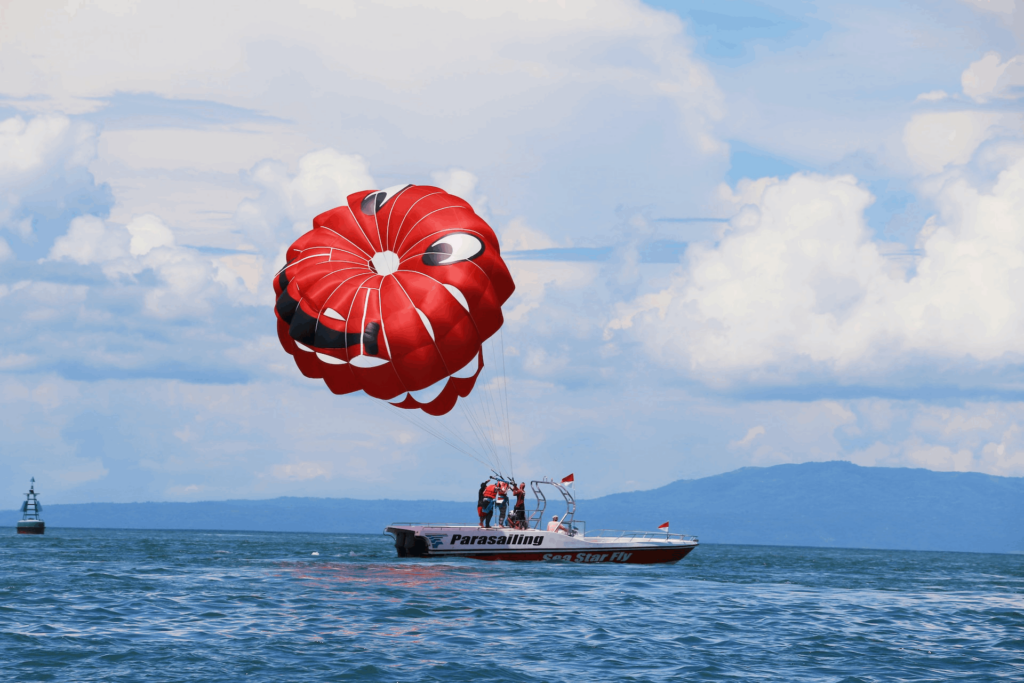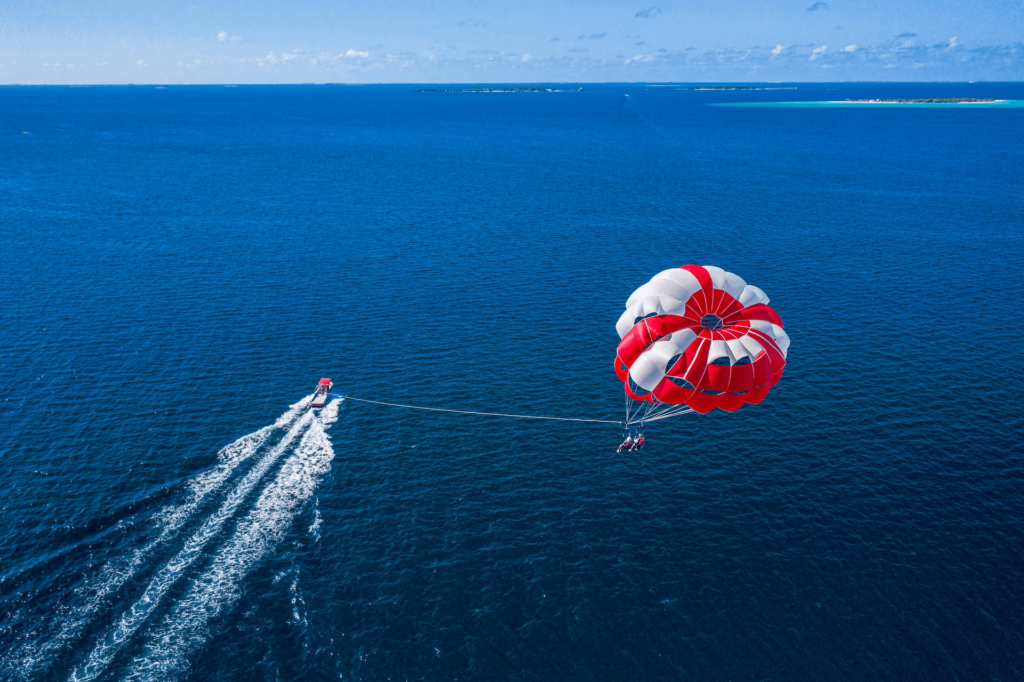With breathtaking beaches and over a hundred parasailing operators, Florida boasts more people flying high above open water than any other state. It has many sought-after locations for parasailing, with the Florida Keys being one of them.
Parasailing offers breathtaking views and an extraordinary sense of freedom for many people. Unfortunately, companies providing this fun activity and experience don’t always operate with the appropriate safety standards.
Anyone considering parasailing in the Florida Keys should know that few regulations govern the industry. The lack of oversight in parasail operator training and acceptable flight conditions could increase unnecessary risks for participants.
Most people agree that parasailing is relatively safe, but many things can go wrong when riding at extreme heights. They can lead to catastrophic consequences.
During a parasailing trip, operators secure you using a harness connected to a parasail canopy. A rope stretches between it and the boat. It lifts you high in the sky like a kite after the operator pulls the ship at high speeds.
You cannot maneuver the parasail or adjust your flight conditions while sailing at great heights. Thus, when you fall or collide with other objects, you can lose limbs or suffer fatal injuries. Most parasailing accidents in the Florida Keys result from boating or commercial parasailing negligence.
Suppose you or one of your family members get injured in a parasailing accident that is not your fault. In that case, you can seek justice and compensation with the help of an experienced attorney.
Key Takeaways
|
Overview of Florida Parasailing Regulations
Parasailing was an unregulated activity in Florida before 2014. But following several accidents and fatalities in the state, the parasailing sector received national attention.
Two tragic incidents in South Florida garnered significant media coverage, playing a crucial role in regulating the parasailing activities in the state.
In 2007, Amber White lost her life after strong winds caught her parasail chute. It snapped the parasail line, causing her and her sister to smash into the roof of a hotel. Several years later, Kathleen Miskell died in 2012 after her harness broke and she fell more than 150 feet.
The discovery that the industry lacked oversight and regulation led legislators to enact strict requirements and rules on parasailing operators. Sponsored by State Sen. Maria Sachs, the White-Miskell Act was passed in October 2014.
Section 327.375 of the Florida Statutes specifies the following requirements for vessel operators of commercial parasailing companies:
- Have liability coverage of at least $1 million for each occurrence and $2 million annual aggregate.
- Provide proof of
insurance containing theinsurance carrier’s information and policy number, which must be accessible for inspection and to all customers who request it. - Obtain a valid and up-to-date license from the United State Coast Guard authorizing the operator to transport paying passengers.
- Equip the vessel with VHF marine transceiver and a separate electronic device to monitor weather conditions and National Weather Service forecasts.
- Must keep a log of weather conditions before commencing operations.
The law also regulates the operation of commercial parasailing. Specifically, it prohibits commercial parasailing activities in Florida’s waters in the following scenarios:
- The current wind conditions in the area of operation show a sustained wind speed of over 20 miles per hour
- The wind gusts exceed the sustained wind speed by 15 miles per hour
- Rain or heavy fog causes visibility to drop less than a half mile
- There’s a lightning storm within 7 miles of the parasailing area
Regulations of the parasailing industry primarily address weather conditions. This is due to the significant influence of weather on the safety of this activity.
Note that there are still no federal laws on parasailing in the US. But Florida’s parasailing laws and safety regulations help establish context for any legal proceedings associated with parasailing accidents.
Potential Causes of a Parasailing Accident in the Florida Keys
Florida’s safety standards and guidelines can help prevent many parasailing fatalities and injuries. However, implementing measures that ensure safe parasailing experiences often conflicts with a business’s bottom line.
Companies may prioritize their financial interest over safety concerns. They may only promote the thrilling experiences of parasailing without providing accurate information about potential hazards. As a result, novices to the activity are likely to become uninformed risk-takers.
Numerous factors can play a part when parasailing goes wrong. Understanding what they are may help you stay safe. Below are the common potential causes associated with parasailing accidents.
Poor weather conditions
Poor weather conditions significantly contribute to parasailing accidents. Strong winds over 10-15 mph can cause towlines to snap and other mechanical components to fail. It can displace you from the boat or send you crashing into the waves, resulting in serious injuries.
Companies must adhere to regulations prohibiting them from operating in unfavorable weather conditions. But there are instances where operators may take a risk and proceed with their operations. They may hope that conditions will either improve or not deteriorate further.
Even if you are a thrill-seeker, parasailing operators should avoid sending you up in windy conditions. You can be at considerable risk if they fail to monitor the weather for any dangerous shift.
Towline failures
Parasailing equipment has many components. Failure to maintain any part and exposing them to bad weather can result in breakage and severe accidents.
The National Transportation Safety Board reports that towline failure is the primary cause of parasailing injuries and fatalities. Different factors cause failures to occur significantly below the rated towline strengths.
One is the presence of bowling knots that can reduce the towline strength by up to 70 percent. It turns out it can weaken even brand-new and sturdy ropes. A weak towline could easily break during a parasailing trip, especially if it encounters strong winds.
The tow line is responsible for connecting the parasail chute and the boat. When it snaps, the parasailer in mid-flight can fall considerable distances and collide with objects like boats, buildings, trees, and bridges. Even safe water landing after a towline break can result in drowning fatalities.
Asking questions about the towline before engaging in a parasailing activity is highly advisable. Inquire about the storage method, frequency of replacement, and the crew’s training level to ensure you get a safe and robust towline.
Operator error
Your parasailing equipment may be in perfect condition, and the weather patterns are ideal. However, an inexperienced boat or parasailing operator can still put you in extreme danger.
A seemingly minor mistake could lead to catastrophic parasailing injuries or deaths. Some errors that boat or parasailing operators could make include the following:
- Not conducting a comprehensive safety briefing before the flight
- Operating in adverse weather conditions
- Allowing an excessive amount of slack in the towline
- Performing parasailing operations too close to the shoreline
- Exceeding the approved elevation limits for parasailers
Who is responsible for parasailing accident injuries in the Florida Keys?


Victims of parasailing accidents can seek damages from multiple parties if they can prove negligence. However, identifying the company or individual responsible for the accident is crucial.
Remember that not all cases of parasailing accidents result in a clear-cut determination of fault. Various factors influence the overall safety of parasailing, making it difficult to assign liability.
Nevertheless, liable parties for the Florida Keys parasailing accident injuries typically include the following entities.
Parasailing company
Like all recreational and adventure businesses, parasailing companies have a legal duty to ensure their client’s safety. They must provide a reasonably secure experience that adheres to industry standards.
If accidents occur because they fail to comply with the safety regulations, they could be liable for damages. You can also hold parasailing companies responsible for accidents that result from poor employee or staff training and supervision.
Equipment manufacturers
A faulty harness that doesn’t adequately secure parasailers and a defective parachute that doesn’t stay in the air can present safety hazards.
Suppose you get injured in a parasailing accident caused by defective equipment. In that case, you could also take legal action against the manufacturer. However, if the parasail operator caused the equipment’s malfunction, it may be impossible to hold the manufacturer accountable.
Boat captain or parasail operator
The boat captain is responsible for ensuring a safe flight and landing. If they make any mistakes that harm the participant in the air, they can be liable for any injuries. You can also hold a parasail operator accountable if they exhibit negligent or reckless conduct that causes you harm. These may include failing to monitor weather conditions and exposing you to the risk of poor weather.
What damages can you recover from a Florida Keys parasailing accident?
A fun vacation can become a nightmare in an instant, as exemplified in the cases of White and Miskell. Filing a personal injury claim and obtaining financial compensation is possible if you sustain injuries in a parasailing accident. If the incident results in the death of a loved one, the surviving family member can also file a wrongful death lawsuit.
Victims’ injuries following a parasailing accident may vary in type and severity. These may include but are not limited to fractures, back injuries, and traumatic brain injuries.
Damages vary significantly in parasailing cases, depending on the accident’s severity, length of recovery, and long-term impact of the injuries. Generally, recoverable damages after a parasailing accident in the Florida Keys fall into the following categories.
Economic damages
Economic damages are your direct financial losses from the accident, making them easy to calculate and prove. You can use and establish them using a variety of documents like bills, invoices, receipts, and time cards.
These damages may include medical treatment costs, loss of wages and earning capacity, property damage, and other out-of-pocket related expenses. They may also cover funeral and burial expenses for cases that involve wrongful death.
Non-economic damages
These are intangible losses after getting injured in an accident. Unlike economic damages, they are subjective and have no monetary value.
The basis for non-economic damages is how the injuries impact your quality of life physically, mentally, and emotionally. You can support your claims with expert witness testimonies. These damages include pain and suffering, emotional distress, loss of companionship, and diminished quality of life.
A Look Into a Fatal Parasailing Accident in the Florida Keys


Despite safety rules and regulations in Florida, parasailing accidents are a frequent source of severe injuries and fatalities.
The death of Illinois mother Supraja Alaparthi reminds us of the catastrophic consequences of parasailing in the state. Her 10-year-old son Sriakshith Alaparthi and 9-year-old nephew Vishant Sadda also sustained injuries in the same incident. It happened on Memorial Day, May 30, 2022,
According to an investigation by the Florida Fish and Wildlife Conservation Commission, the three victims were parasailing when high winds hit. The unexpected storm prompted Daniel Gavin Couch, the boat captain, to cut the line tethered to the victims.
That dragged the parasail through the water, slamming the victims into the Old Seven Mile Bridge in the Florida Keys. John Callion witnessed the incident and rushed to rescue and pull them into this boat.
He handed them over to the awaiting paramedics. The mother was pronounced dead, and the nephew was in critical condition. Her son suffered minor injuries.
The boat captain Couch faced charges of manslaughter and breaches of commercial parasailing laws for his alleged involvement in the incident’s fatality and injuries. The victim’s family also filed a lawsuit against the parasailing company, Lighthouse Parasailing, Inc. The family’s attorneys claimed that they violated several aspects of the safety regulations for commercial parasailing.
Many experts assert that the parasailing industry needs more stringent measures to prevent these catastrophic accidents.
The Importance of Hiring an Attorney After a Parasailing Accident
Parasailing accidents can happen for many reasons, but negligence is a significant factor. In such cases, injured victims and their surviving family members may be eligible for seeking damages against the negligent parties.
However, numerous issues could arise when you’re not adequately informed about how to proceed and the requirements for the claim. This ignorance could result in the loss of possible compensation. Hiring an experienced attorney is critical to your parasailing accident case.
It can be challenging to establish fault and negligence. But attorneys have the resources to conduct thorough investigations. They will also collect the necessary evidence to substantiate your case, such as medical records and expert witness testimonies.
Suppose the defendant’s


Pro Tip
Beware of parasailing operators who hand over a release of liability form without discussing its contents. Ensure that they provide you with a comprehensive explanation of the potential risks involved before signing anything. You may be giving up your right to compensation if you get into an accident.
Hurt in a Parasailing Accident? Visit The Personal Injury Center
Injuries after a parasailing accident can leave you with significant pain and losses. In the worst cases, they can result in the death of a loved one.
Financial compensation can’t bring the life of a family member or your once-perfect health back. But it can help your recovery and return to normal life. The Personal Injury Center can assist you in finding experienced legal counsel after a parasailing accident in the Florida Keys.
Take the first step towards recovery and schedule a free case evaluation with us today. We’ll match you with lawyers who will work tirelessly to protect your rights and secure fair compensation.
Protect your rights after a parasailing accident. Find an experienced attorney through The Personal Injury Center.
FAQs on Parasailing Accidents in the Florida Keys
If you sign a liability waiver before a parasailing accident, can you take legal action?
Engaging in high-risk activities like parasailing often involves signing a waiver or release of liability. Many individuals assume they have no legal recourse if they sustain injuries after signing a waiver.
But that's not necessarily the case. Liability waivers don't protect the company from getting sued if there is negligence. It means you may still recover compensation even if you signed a waiver.
How much is a parasailing accident case worth?
As with all personal injury cases, a parasailing injury claim's worth will depend on the losses you sustained. Note that you may only collect what your evidence can prove.
For instance, a traumatic brain injury from a parasailing accident could cost you hundreds of thousands of dollars in lost earnings and medical bills. Such amounts may only be recoverable if you have sufficient proof to demonstrate them.
What are the chances your parasailing accident case will go to court?
The likelihood your parasailing accident case will go to court depends on numerous factors. These may include how cooperative the insurer is, the amount they're willing to offer you, and the extent of your injuries. But in many cases, most parasailing injury claims end in out-of-court settlements and never get to trial.



